Dandruff and dry scalp are common scalp issues that cause itchiness and flakes, but they have different causes and require distinct treatments. In this blog post, we'll clarify the key differences between these two conditions, explore their root causes, and provide effective treatment options to help you make an informed decision for your scalp health.
Dandruff, or seborrheic dermatitis, is characterised by white or yellowish flakes, redness, inflammation, and itching. It is caused by factors such as the Malassezia fungus, excessive oil production, and genetics. Dry scalp, on the other hand, results from a lack of moisture, leading to small, white flakes, tightness, and itching. Causes include weather, harsh hair care products, and skin conditions like eczema and psoriasis.
To treat dandruff, over-the-counter medicated shampoos containing active ingredients like zinc pyrithione, selenium sulphide, or ketoconazole are effective. For dry scalp, gentle, hydrating shampoos, and conditioners can provide relief, while avoiding harsh chemicals and excessive heat styling. In both cases, maintaining a healthy scalp through proper hair care practices and using appropriate products is crucial.
To differentiate between dandruff and dry scalp, pay attention to the appearance of the flakes and the presence of redness or inflammation. Understanding these subtle differences will help you identify the right course of action for your scalp health.
What is Dandruff?
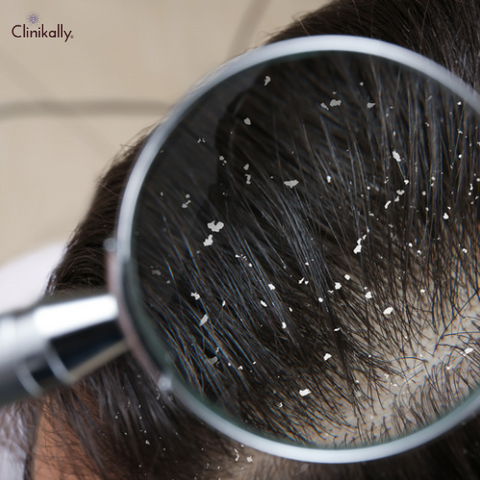
Dandruff, a common scalp concern, is caused by various factors, including the Malassezia fungus, excessive oil production, and genetic predisposition. The presence of white or yellowish flakes, accompanied by redness, inflammation, and itching, is characteristic of dandruff. Let's dive deeper into its causes, symptoms, and common misconceptions.
Causes of Dandruff
Malassezia fungus: This yeast-like fungus lives on the scalp and feeds on the oils secreted by the hair follicles. In some individuals, it can cause irritation and increased skin cell turnover, resulting in dandruff flakes.
-
Excessive oil production: An overly oily scalp can create a favourable environment for Malassezia to thrive, exacerbating dandruff.
-
Genetic predisposition: Genetics can play a role in the development of dandruff, as some individuals may be more prone to it due to their family history.
Common Symptoms of Dandruff
White or yellowish flakes
-
Scalp redness and inflammation
-
Itching
-
Oily scalp
Common Misconceptions about Dandruff
Dandruff is caused by dryness: Contrary to popular belief, dandruff is not a result of dry scalp; instead, it often stems from an oily scalp and other factors mentioned above.
-
Infrequent hair washing causes dandruff: While it's true that not washing your hair can lead to oil build-up, dandruff's primary cause is the factors discussed above rather than the hair washing frequency.
-
Dandruff is contagious: Dandruff is not contagious and cannot be transmitted through shared hairbrushes or physical contact.
What is Dry Scalp?
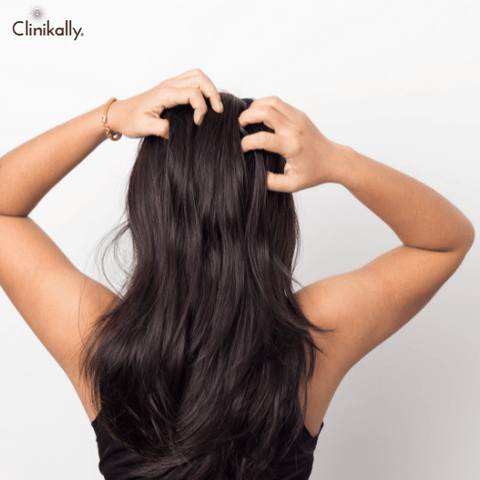
Dry scalp, another frequent scalp issue, occurs when the scalp lacks sufficient moisture, leading to tightness, itching, and small, white flakes. Unlike dandruff, which is caused by factors like the Malassezia fungus and excessive oil production, dry scalp results from various external and internal factors. In this section, we'll examine the causes, symptoms, and misconceptions surrounding dry scalp.
Causes of Dry Scalp
-
Weather: Cold, dry weather can strip the scalp of its natural moisture, leading to dryness and flakiness.
-
Hair care products: Harsh shampoos, conditioners, and styling products can strip the scalp of its natural oils, causing dryness.
-
Hot water: Frequent use of hot water when washing your hair can exacerbate scalp dryness by removing essential oils.
-
Skin conditions: Eczema, psoriasis, and contact dermatitis can cause dry scalp as a result of skin inflammation and irritation.
-
Dehydration: Inadequate water intake can impact overall skin health, including the scalp, leading to dryness.
Common Symptoms of Dry Scalp
-
Small, white flakes
-
Scalp tightness
-
Itching
-
Dry hair
Common Misconceptions about Dry Scalp
-
Dry scalp and dandruff are the same: Although both conditions can cause flakes and itching, they have different causes and require distinct treatments. Dandruff is primarily caused by the Malassezia fungus and excessive oil production, while dry scalp results from a lack of moisture.
-
Oiliness causes dry scalp: Unlike dandruff, which is often linked to an oily scalp, dry scalp is associated with a lack of natural oils on the scalp, leading to dryness and flakiness.
-
Using less shampoo will cure dry scalp: While overusing harsh shampoos can contribute to scalp dryness, merely reducing shampoo usage may not be sufficient to treat dry scalp. Instead, opt for gentle, hydrating shampoos and conditioners specifically formulated to address scalp dryness.
To manage and prevent dry scalp, consider the following tips:
-
Choose gentle hair care products: Opt for sulfate-free, hydrating shampoos and conditioners designed for dry scalp.
-
Limit hot water usage: Use lukewarm water when washing your hair to preserve the scalp's natural oils.
-
Moisturise your scalp: Regularly apply natural oils, such as jojoba or coconut oil, to help maintain scalp hydration.
-
Protect your scalp from harsh weather: In cold, dry weather, wear a hat to shield your scalp from the elements and maintain moisture.
-
Stay hydrated: Drink plenty of water to support overall skin and scalp health.
In conclusion, recognizing the differences between dandruff and dry scalp is essential for choosing the appropriate treatments and maintaining a healthy scalp. While dandruff is caused by factors like the Malassezia fungus, excessive oil production, and genetics, dry scalp results from a lack of moisture due to various external and internal factors. By understanding the causes, symptoms, and misconceptions surrounding dry scalp, you can make informed decisions about your hair care routine and achieve a healthier, itch-free scalp.
How to Treat Dandruff & Dry Scalp
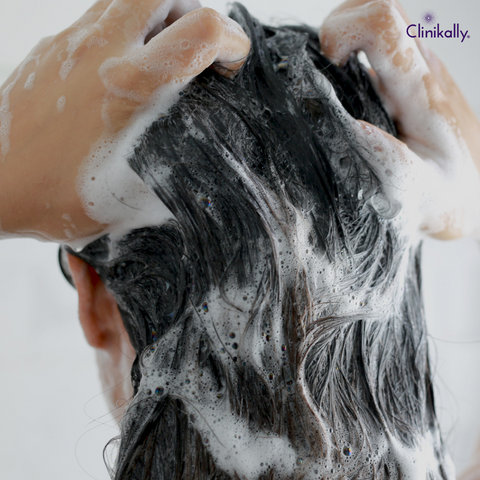
Understanding the differences between dandruff and dry scalp is crucial when selecting the appropriate treatment methods. While both conditions share some symptoms, their root causes and treatments differ. In this section, we'll outline various treatment options and preventative measures for both dandruff and dry scalp, helping you maintain a healthy, itch-free scalp.
Treatments for Dandruff
-
Over-the-counter medicated shampoos: Shampoos containing active ingredients such as zinc pyrithione, selenium sulphide, salicylic acid, or ketoconazole can effectively combat dandruff by targeting the Malassezia fungus and reducing oil production.
-
Zinc pyrithione: Antifungal and antibacterial properties help control the Malassezia fungus.
-
Selenium sulphide: Reduces the rate of skin cell turnover and combats the fungus.
-
Salicylic acid: Helps exfoliate the scalp, removing dead skin cells and flakes.
-
Ketoconazole: A powerful antifungal agent effective against dandruff-causing fungus.
-
Prescription medications: If over-the-counter shampoos do not provide relief, consult your doctor for prescription-strength shampoos, creams, or lotions.
-
Lifestyle changes: Manage stress levels, maintain a balanced diet, and avoid irritants such as harsh hair care products to help prevent dandruff flare-ups.
Treatments for Dry Scalp
-
Gentle, hydrating shampoos and conditioners: Opt for sulfate-free, moisturising hair care products specifically formulated for dry scalp.
-
Scalp moisturisers and oils:Apply natural oils like jojoba, coconut, or olive oil to the scalp to help retain moisture.
-
Humidifiers: Use a humidifier in your living space, especially during winter months, to maintain a healthy level of humidity and prevent scalp dryness.
-
Limit use of heat styling tools: Excessive heat can strip the scalp of moisture, so reduce the use of blow dryers, curling irons, and flat irons.
Preventative Measures for Both Dandruff & Dry Scalp
-
Maintain a balanced diet: A healthy diet rich in vitamins, minerals, and essential fatty acids supports overall scalp health.
-
Zinc: Found in lean meats, poultry, and nuts, zinc helps maintain oil gland function.
-
Omega-3 fatty acids: Found in fatty fish, flaxseeds, and walnuts, Omega-3s support skin hydration and reduce inflammation.
-
Vitamin B: Found in whole grains, legumes, and green vegetables, B vitamins promote healthy skin and hair.
-
Proper hair washing technique: Use lukewarm water and gently massage the scalp with your fingertips, avoiding the use of nails, which can cause irritation.
-
Manage stress levels: Stress can exacerbate both dandruff and dry scalp, so practise stress-relieving activities like yoga, meditation, or exercise.
-
Regularly clean hairbrushes and combs: Keep your hair care tools clean to avoid transferring oil, dirt, or fungal spores back onto your scalp.
To recap, treating dandruff and dry scalp effectively requires understanding the root causes and selecting appropriate treatments. For dandruff, over-the-counter medicated shampoos, prescription medications, and lifestyle changes can help alleviate symptoms. For dry scalp, focus on gentle, hydrating hair care products, scalp moisturisers, and maintaining a healthy environment for your scalp. Preventative measures, such as a balanced diet, proper hair washing technique, stress management, and regular cleaning of hair care tools, can benefit both conditions and contribute to overall scalp health.
In conclusion, knowing the differences between dandruff and dry scalp is essential for choosing the right treatments and maintaining a healthy, itch-free scalp. By following the outlined treatment options and preventative measures for both conditions, you can effectively manage your scalp health and enjoy a flake-free, comfortable head of hair. Don't forget that each individual's scalp is unique, so be patient and willing to experiment with different treatments to find the best solution for your specific needs.
When to Consult a Doctor?
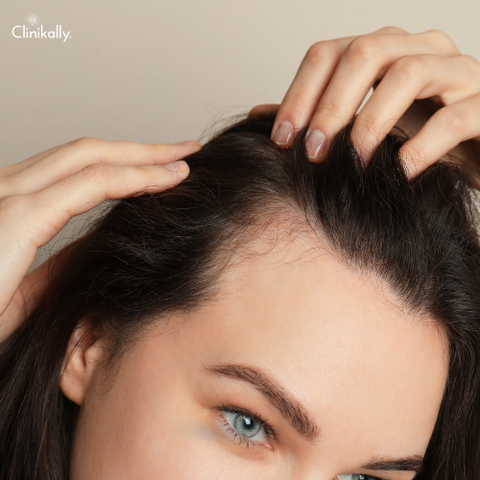
While many cases of dandruff and dry scalp can be effectively managed with over-the-counter treatments and lifestyle changes, there are instances when seeking professional help becomes necessary. It's important to recognize the signs that indicate the need to consult a doctor, as some symptoms may be indicative of an underlying health condition or require prescription-strength treatment.
Consider consulting a doctor if you experience any of the following:
-
Persistent symptoms: If you've tried over-the-counter treatments and home remedies for several weeks without any noticeable improvement, it's time to see a doctor for a more accurate diagnosis and targeted treatment plan.
-
Severe itching and discomfort: Intense itching and discomfort that interferes with your daily activities or sleep may warrant a visit to a healthcare professional.
-
Scalp inflammation, redness, or infection:Signs of infection, such as oozing, crusting, or excessive redness and inflammation, should be evaluated by a doctor to prevent complications and receive appropriate treatment.
-
Presence of other skin conditions: If you have a pre-existing skin condition like eczema, psoriasis, or contact dermatitis, it's essential to consult a doctor for tailored advice on managing your scalp health.
In summary, it's crucial to know when to seek professional help for dandruff or dry scalp. Persistent symptoms, severe itching, scalp inflammation, or the presence of other skin conditions are all valid reasons to consult a doctor. A healthcare professional can accurately diagnose the issue and prescribe appropriate treatments, ensuring your scalp health is effectively managed and improving your overall quality of life.
Best Hair Products to Try to Combat Dandruff & Dry Scalp
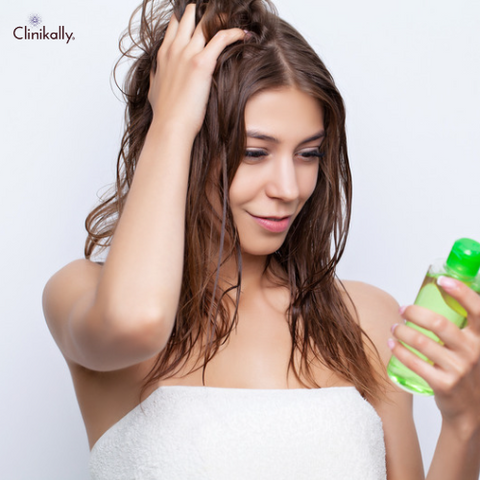
Finding the right hair products to address dandruff and dry scalp can be challenging, but with a little research and experimentation, you can discover the most effective solutions for your specific needs. To help you in your quest for a healthy, flake-free scalp, we've compiled a list of five highly-rated hair products with brief introductions:
-
Selsun Suspension: Selsun Suspension is a medicated shampoo containing the active ingredient selenium sulphide, which is effective in treating dandruff and seborrheic dermatitis. This shampoo works by slowing down skin cell turnover and combating the Malassezia fungus, reducing dandruff symptoms. It's essential to follow the recommended usage instructions and consult a doctor if symptoms persist.
-
8X Shampoo: 8X Shampoo is a potent anti-dandruff shampoo containing ciclopirox olamine and zinc pyrithione as its active ingredients. This combination of antifungal and antibacterial agents effectively controls dandruff and provides relief from itching and flaking. To achieve the best results, follow the recommended usage guidelines and use it consistently.
-
Hair 4U Shampoo: Hair 4U Shampoo is formulated with piroctone olamine, a highly effective antifungal agent that helps combat dandruff and maintain a healthy scalp. Additionally, this shampoo contains a blend of nourishing ingredients like aloe vera and provitamin B5 to soothe and moisturise the scalp, making it suitable for those with dry scalp concerns.
-
Sebamed Anti-Dandruff Shampoo: Sebamed Anti-Dandruff Shampoo is a gentle yet effective solution for dandruff-prone scalps. With its pH-balanced formula and active ingredient, piroctone olamine, this shampoo helps maintain a healthy scalp environment and reduce dandruff symptoms. It's also free from harsh chemicals like sulphates, making it suitable for sensitive scalps.
-
Candid TV Suspension: Candid TV Suspension is a unique liquid suspension shampoo containing the active ingredients clotrimazole and selenium sulphide. This powerful combination effectively treats dandruff and seborrheic dermatitis while providing relief from itching and flaking. For optimal results, use Candid TV Suspension as directed and consult a doctor if symptoms persist.
When trying out these hair products, it's essential to follow the manufacturer's instructions and consult a healthcare professional if symptoms persist or worsen. Remember, finding the best product for your dandruff or dry scalp may require some trial and error, so be patient and give each product adequate time to show results before switching to another option. With the right hair care regimen, you can effectively combat dandruff and dry scalp, achieving a healthier, more comfortable scalp.
Bottom Line: Get Rid of Dandruff & Dry Scalp
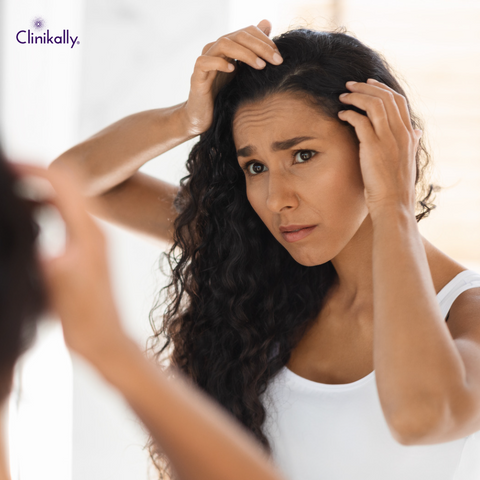
Dealing with dandruff and dry scalp can be frustrating and uncomfortable, but with the right knowledge, products, and strategies, it's possible to manage these common scalp conditions effectively. To recap:
-
Understand the differences between dandruff and dry scalp, as they have distinct causes and require specific treatments.
-
Implement appropriate treatment options and preventative measures for both conditions, including using medicated shampoos for dandruff and gentle, hydrating products for dry scalp.
-
Consult a doctor if symptoms persist, worsen, or indicate a more serious underlying issue.
-
Experiment with highly-rated hair products, such as Selsun Suspension, 8X Shampoo, Hair 4U Shampoo, Sebamed Anti-Dandruff Shampoo, and Candid TV Suspension, to find the most effective solution for your specific needs.
By taking a proactive approach to your scalp health, you can successfully combat dandruff and dry scalp, ultimately achieving a healthier, flake-free, and more comfortable head of hair. Remember that patience and consistency are key, as it may take some time and experimentation to find the right combination of treatments and products that work best for your individual scalp. Stay persistent, and you'll be well on your way to a happier, itch-free scalp.
































